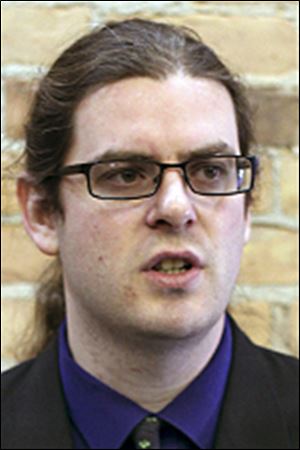
SATURDAY ESSAY
Mayor, city should wake up to urban ag
1/14/2017
Nestor
URBAN AGRICULTURE is a burgeoning enterprise that is vital to shaping Toledo’s future. It is a practical and economical way to restore the environment, provide a healthier food supply, promote entrepreneurship, and combat blight.
Yet the city of Toledo — which touts itself as a bastion of progressive thought — has repeatedly contradicted its own rhetoric by working against prominent examples of urban agriculture for the flimsiest of reasons.
First, the city decided that a bed of native plants (which have countless ecological benefits) along the Anthony Wayne Trail had become overgrown, so they had the entire thing mowed down — not trimmed, not maintained, but destroyed. That it was planted specifically by the award-winning Toledo Zoo as part of an initiative to strengthen our local ecology didn’t matter. Someone didn’t like the way it looked, so it had to go.
Now, the city is working to hamstring the urban agriculture efforts of local entrepreneur Thomas Jackson on similar grounds. A relative of Councilman Tyrone Riley doesn’t like the way it looks (or maybe just doesn’t like Mr. Jackson), so it’s got to go.
Mr. Jackson is a professional landscaper with numerous certificates from the Ohio Nursery and Landscape Association, and a certified master urban farmer through the Ohio State University Extension. Some years back, he acquired some vacant lots around his house and has been transforming them from trash-ridden blight to healthy organic gardens. His long-term vision is to restore the soil and grow organic produce for sale or donation.
He is, in short, the kind of person the city claims it would love to see more of. Yet, every level of local government is working to stand in his way — from council, to the mayor’s administration, to the municipal court. Why?
The arguments against Mr. Jackson and his work vary, depending on who you talk to.
Councilman Riley, speaking for a conspicuously silent council, states that the problem is with odor and rodents — claims contradicted by reports from neighbors, as well as both the Lucas County Health Department and the city’s Department of Environmental Services.
The city administration states that the problem is with neighborhood complaints — claims contradicted by the work of five volunteers who obtained signatures from more than 150 supportive neighbors in the span of just a few hours.
The court has ruled that the problem is that the wood chips he is using to restore vital nutrients to the soil constitute trash and must therefore be removed — a ruling of obvious absurdity that has galvanized many in the local urban agriculture community who are rightly concerned about the chilling effect that this precedent creates.
Mr. Jackson has been ordered by Judge C. Allen McConnell to clear his lots of trash (read: wood chips) and nonexistent rodents by Feb. 22, based on the testimony of a few neighbors with a personal axe to grind — one of whom, according to court documents, “was somewhat confused as to where the lots were located” and another of whom just happens to be related to the district council member.
In court, Mr. Jackson was even prohibited from discussing urban agriculture or calling in witnesses who could vouch for the validity of his methods by Judge McConnell. In their motion to request the ban, the prosecution stated the following:
“Defense counsel has indicated that the defense in this case would be to present testimony, possibly from an expert, regarding urban farming or urban gardening. Nowhere in the Toledo Municipal Code exists an exception to creating a nuisance if it is for urban gardening. Maybe there should be, but this court is the wrong venue for those arguments. If the defendant wants the right and an exception for urban farming, he needs to make those arguments with council or the legislative branch.”
So there it is: our supposedly progressive, forward-thinking city government does not even legally recognize that urban agriculture exists, errs on the side of classifying it a nuisance, and criminalizes practices it doesn’t understand.
Mr. Jackson deserves better. We deserve better.
Since this situation began, many in the urban agriculture community (including Mr. Jackson) have come together and worked on an ordinance that would set clear and reasonable guidelines for urban agriculture practices in the city. Council members should support that initiative when it is presented to them.
Meanwhile, the mayor should intervene and drop the city’s bogus case against Mr. Jackson.
The conflict between Mr. Jackson and his neighbors should be mediated through the city’s Board of Community Relations — not the courts. There is still time to turn these events from a tragedy to a learning experience — and a positive step forward for all.
Sean Nestor is the co-chairman of the Lucas County Green Party.